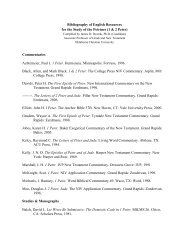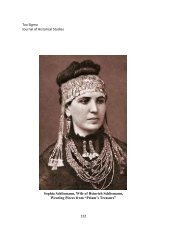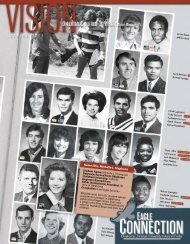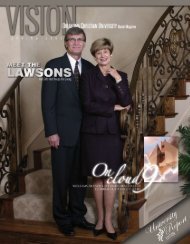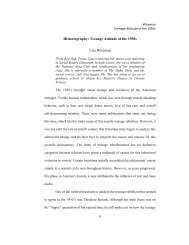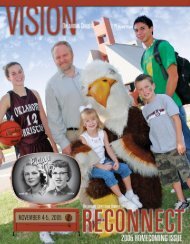Reeducation of German POWs during World War II - Oklahoma ...
Reeducation of German POWs during World War II - Oklahoma ...
Reeducation of German POWs during World War II - Oklahoma ...
You also want an ePaper? Increase the reach of your titles
YUMPU automatically turns print PDFs into web optimized ePapers that Google loves.
! !"#$%&'("$<br />
"#$%&'(!#)!*+,-#%+.'(!/-$0+1,2!3#(4!55!<br />
$<br />
Chapel at Fort Reno, <strong>Oklahoma</strong>, a <strong>German</strong> POW camp in America<br />
$ )*+$
!<br />
Foote!!<br />
"#$%&'!()*+!,'!)-.&/0%&!<br />
<strong>Reeducation</strong> <strong>of</strong> <strong>German</strong> <strong>POWs</strong> <strong>during</strong> <strong>World</strong> <strong>War</strong> <strong>II</strong> in the<br />
State <strong>of</strong> <strong>Oklahoma</strong><br />
Joseph Foote<br />
Joseph Foote is from, most recently, Norman, <strong>Oklahoma</strong>. A graduate <strong>of</strong><br />
Norman North High School and a recent graduate from the University <strong>of</strong><br />
<strong>Oklahoma</strong>, his primary focus in his studies at OU was international<br />
studies. He is also interested in history and anthropology. Outside <strong>of</strong> the<br />
classroom, he enjoys music, playing his guitar with his band, outdoor<br />
activities, and sports. Joseph’s paper took second place in the American<br />
Undergraduate Research category at the 2012 Phi Alpha Theta Regional<br />
Conference.<br />
Few Americans know that the United States was home to almost<br />
half a million Axis prisoners spread out across the United states <strong>during</strong><br />
the Second <strong>World</strong> <strong>War</strong>.<br />
Even fewer Americans know about the<br />
attempted “reeducation” <strong>of</strong> prisoners <strong>of</strong> war <strong>during</strong> their time spent<br />
interned in the United States. The lack <strong>of</strong> public knowledge about the<br />
reeducation efforts could be because <strong>of</strong> the general consensus that the<br />
program was unsuccessful.<br />
This research provides evidence that the Intellectual Diversion<br />
Program, created to reeducate prisoners <strong>of</strong> war <strong>during</strong> <strong>World</strong> <strong>War</strong> <strong>II</strong>, can<br />
be seen as a successful attempt in the state <strong>of</strong> <strong>Oklahoma</strong>. 1<br />
Primary<br />
source documents from the <strong>Oklahoma</strong>-based program show that the<br />
pr<strong>of</strong>essors conducting the lectures for the reeducation program, the<br />
!!!!!!!!!!!!!!!!!!!!!!!!!!!!!!!!!!!!!!!!!!!!!!!!!!!!!!!!<br />
1 All <strong>of</strong> the primary source research done for the purpose <strong>of</strong> this paper was found<br />
in the University <strong>of</strong> <strong>Oklahoma</strong> Libraries Western History Collections. More<br />
specifically, the Prisoner <strong>of</strong> <strong>War</strong> Camps Collection, Box P-20, Folders 1-4.<br />
"#"! !
! !"#$%&'("$<br />
"#$%&'(!#)!*+,-#%+.'(!/-$0+1,2!3#(4!55!<br />
$<br />
<strong>of</strong>ficers running the prisoner <strong>of</strong> war camps, and even the prisoners<br />
themselves thought the program was beneficial and quite successful. 2<br />
Before presenting this evidence, I will provide a general background on<br />
prisoners <strong>of</strong> war in the United States, a brief section dedicated to the<br />
three <strong>Oklahoma</strong> prisoner <strong>of</strong> war camps that will be examined and<br />
discussed in this paper, and a general overview <strong>of</strong> the Intellectual<br />
Diversion Program itself.<br />
The successful allied campaigns in North Africa and Italy in<br />
1943 produced the first large influx <strong>of</strong> axis prisoners <strong>of</strong> war. A major<br />
issue became what to do with them. Great Britain was already<br />
overcrowded with <strong>POWs</strong> and could not take on the voluminous numbers<br />
<strong>of</strong> captured Axis prisoners pouring in. The United Sates was seen as a<br />
plausible solution to the problem because <strong>of</strong> its large land area and<br />
distance from the theaters <strong>of</strong> war even though it had made few<br />
preparations to house such prisoners; much work was still to be done. 3<br />
An administrative system had to be created to oversee prisoners<br />
<strong>of</strong> war along with construction <strong>of</strong> the camps that had to be completed<br />
prior to the arrival <strong>of</strong> Axis prisoners. This was no small feat considering<br />
the United States lack <strong>of</strong> preparation. The <strong>War</strong> Department was the<br />
$$$$$$$$$$$$$$$$$$$$$$$$$$$$$$$$$$$$$$$$$$$$$$$$$$$$$$$$<br />
2 When looking at the overall success or failure <strong>of</strong> the <strong>Oklahoma</strong>-based<br />
reeducation program, the potential biases <strong>of</strong> the two pr<strong>of</strong>essors, <strong>War</strong>dell and<br />
Willibrand, as well as Lt. Speakman must be noted because <strong>of</strong> their involvement<br />
and vested interest in the program.<br />
3 Antonio Thompson, Men In <strong>German</strong> Uniform: <strong>POWs</strong> in America During<br />
<strong>World</strong> <strong>War</strong> <strong>II</strong> (Knoxville. The University <strong>of</strong> Tennessee Press, 2010), 1.<br />
$ )*+$
Foote!!<br />
"#$%&'!()*+!,'!)-.&/0%&!<br />
!<br />
primary agency charged with the oversight <strong>of</strong> prisoners <strong>of</strong> war, but had<br />
help from the Office <strong>of</strong> the Provost Marshal Generals Office (OPMG)<br />
and the Military Police Corps (MPC) among others. 4<br />
During the course <strong>of</strong> the Second <strong>World</strong> <strong>War</strong>, there were more<br />
than 430,000 prisoners <strong>of</strong> war interned within United Sates, the majority<br />
<strong>of</strong> whom were <strong>German</strong> (approximately 380,000). 5<br />
The prisoners <strong>of</strong> war<br />
came from all theaters <strong>of</strong> battle. The majority came from the campaigns<br />
in North Africa and Italy.<br />
While the government created camps throughout the United<br />
States, they were primarily located in the southern and western parts <strong>of</strong><br />
the country and areas with high labor shortages. 6<br />
Therefore, <strong>Oklahoma</strong>’s<br />
sparse population and desperate need for labor made it an ideal candidate<br />
for POW camps. The Government built eight base camps in <strong>Oklahoma</strong><br />
along with fourteen more branch camps spread out across the state. 7<br />
Base camps were large, permanent or semi-permanent structures built to<br />
house up to 4,000 prisoners. Branch camps were smaller non-permanent<br />
!!!!!!!!!!!!!!!!!!!!!!!!!!!!!!!!!!!!!!!!!!!!!!!!!!!!!!!!<br />
4 Ibid., 1-3. The <strong>War</strong> Department depended on several other agencies for<br />
assistance with the POW program but they are irrelevant for the sake <strong>of</strong> this<br />
paper. Also, the Provost Marshal General is the commanding <strong>of</strong>ficer <strong>of</strong> the<br />
national network <strong>of</strong> camps.<br />
5 Ron Robin. The Barbed-Wire College: Reeducating <strong>German</strong> <strong>POWs</strong> in the<br />
United States During <strong>World</strong> <strong>War</strong> <strong>II</strong> (Princeton, New Jersey: Princeton<br />
University Press, 1995), 3.<br />
6 Thompson, 3-9.<br />
7 Edward C. Corbett, Interned for the Duration: Axis Prisoners <strong>of</strong> <strong>War</strong> in<br />
<strong>Oklahoma</strong> 1942-1946. Master’s thesis, <strong>Oklahoma</strong> City University, 1965), 12. (I<br />
will only focus on the base camp at Fort Reno and its two branch camps at<br />
Chickasha and Will Rodgers Field. I should also note that there is some<br />
controversy over the number <strong>of</strong> base camps located in <strong>Oklahoma</strong>, but it is not<br />
important for the focus <strong>of</strong> this paper.<br />
"#$! !
! !"#$%&'("$<br />
"#$%&'(!#)!*+,-#%+.'(!/-$0+1,2!3#(4!55!<br />
$<br />
areas for a few hundred to 1,000 prisoners and were <strong>of</strong>ten located near<br />
areas that required seasonal labor. 8<br />
The camp located at Fort Reno, in El<br />
Reno <strong>Oklahoma</strong>, was one <strong>of</strong> <strong>Oklahoma</strong>’s eight base camps. Two smaller<br />
branch camps were built at Will Rogers Field and Chickasha and served<br />
as <strong>of</strong>f shoots <strong>of</strong> the Fort Reno camp. 9<br />
These three camps will be the only<br />
ones examined in this paper because they are the camps primarily<br />
involved in the reeducation program in <strong>Oklahoma</strong>.<br />
The majority <strong>of</strong> prisoners held in the United Sates came from<br />
either the African or Italian campaigns. As a result, all <strong>of</strong> the men<br />
interned at the three <strong>Oklahoma</strong> camps listed above came from Erwin<br />
Rommel’s famous Afrika Korps, and were captured in Tunisia. 10<br />
The<br />
first batch <strong>of</strong> prisoners arrived in <strong>Oklahoma</strong> in the summer <strong>of</strong> 1943. 11<br />
The Provost Marshal Generals Office created the Intellectual<br />
Diversion Program earlier that year in the fall <strong>of</strong> 1943, but they did not<br />
put a real emphasis on the project until the latter part <strong>of</strong> the war. The<br />
program fell under the control <strong>of</strong> the newly created Special Projects<br />
Division (SPD). Among the goals <strong>of</strong> the program were to provide and<br />
encourage ideological alternatives to National Socialism for <strong>German</strong><br />
$$$$$$$$$$$$$$$$$$$$$$$$$$$$$$$$$$$$$$$$$$$$$$$$$$$$$$$$<br />
8 Thompson, 9-10.<br />
9 Corbett, 16.<br />
10 Terry Paul Wilson, “The Afrika Korps in <strong>Oklahoma</strong>: Fort Reno’s Prisoner <strong>of</strong><br />
<strong>War</strong> Compound,” in The Chronicles <strong>of</strong> <strong>Oklahoma</strong> 52 ed. Dr. Kenny A. Franks<br />
(<strong>Oklahoma</strong> City: The <strong>Oklahoma</strong> Historical Society, 1974): 362-366.<br />
11 Ibid., 361-369.<br />
$ )*+$
Foote!!<br />
"#$%&'!()*+!,'!)-.&/0%&!<br />
!<br />
prisoners while promoting democracy and American history and<br />
idealism. 12<br />
The project had to be done covertly in the beginning because<br />
regulations in the 1929 Geneva Convention forbade indoctrination <strong>of</strong><br />
imprisoned combatants; yet, the broadness <strong>of</strong> the Convention’s article<br />
allowed for an equally broad interpretation. 13 The program also recruited<br />
University pr<strong>of</strong>essors from around the country to give lectures on<br />
democracy and other relevant themes deemed acceptable by the Provost<br />
Marshal Generals Office. 14<br />
It must first be noted that many historians regarded the<br />
Intellectual Diversion Program as unsuccessful. Ron Robin argues in his<br />
book The Barbed-Wire College that the program had little if any lasting<br />
effect at all. 15<br />
Antonio Thompson, author <strong>of</strong> Men In <strong>German</strong> Uniform,<br />
seems to agree that the overall program was unsuccessful. 16<br />
Critics <strong>of</strong><br />
the program said that it only reached a fraction <strong>of</strong> the prisoners interned<br />
in the United Sates, was too brief (only lasting about a year in most<br />
camps), and had a broad, ambiguous mission. 17 Another issue that must<br />
be addressed is the vagueness <strong>of</strong> the definition <strong>of</strong> successful when<br />
!!!!!!!!!!!!!!!!!!!!!!!!!!!!!!!!!!!!!!!!!!!!!!!!!!!!!!!!<br />
12 Robin, 3-9.<br />
13 Thompson, 125-126.<br />
14 Correspondence from John B. Cheadle the Office <strong>of</strong> the President at the<br />
University <strong>of</strong> <strong>Oklahoma</strong> to Colonel Francis P. Howard <strong>of</strong> the Provost Marshal<br />
Generals Office. October 4, 1944. Prisoner <strong>of</strong> <strong>War</strong> Camps Collection, Box P-<br />
20, Folder 1. Western History Collections, University <strong>of</strong> <strong>Oklahoma</strong>, Norman,<br />
<strong>Oklahoma</strong>.<br />
15 Robin, 5-13, 127-134.<br />
16 Thompson, 125-127.<br />
17 Ibid.<br />
"##! !
! !"#$%&'("$<br />
"#$%&'(!#)!*+,-#%+.'(!/-$0+1,2!3#(4!55!<br />
$<br />
examining the reeducation program. It is hard to measure something like<br />
the successfulness <strong>of</strong> such a program; however, for the sake <strong>of</strong> the focus<br />
<strong>of</strong> this paper I will use the opinions <strong>of</strong> people involved in the program<br />
(on the teaching and receiving side) as evidence <strong>of</strong> the <strong>Oklahoma</strong>-based<br />
program’s success.<br />
The University <strong>of</strong> <strong>Oklahoma</strong> was one <strong>of</strong> many schools around<br />
the country that assisted in the intellectual diversion <strong>of</strong> <strong>German</strong><br />
prisoners. Although the University <strong>of</strong> <strong>Oklahoma</strong> received requests for<br />
assistance in October <strong>of</strong> 1944, the program did not start in <strong>Oklahoma</strong><br />
until the following year in the fall <strong>of</strong> 1945 after the war in Europe had<br />
ended. 18 The two pr<strong>of</strong>essors selected for the program were Dr. Morris L.<br />
<strong>War</strong>dell, a history pr<strong>of</strong>essor as well as Director <strong>of</strong> the Extension<br />
Divisions, and Dr. William A. Willibrand, a history and language<br />
pr<strong>of</strong>essor at the University <strong>of</strong> <strong>Oklahoma</strong>. 19<br />
The two University <strong>of</strong> <strong>Oklahoma</strong> pr<strong>of</strong>essors gave six lectures at<br />
the base camp in Fort Reno and the two surrounding branch camps at<br />
$$$$$$$$$$$$$$$$$$$$$$$$$$$$$$$$$$$$$$$$$$$$$$$$$$$$$$$$<br />
18 It must be noted that the time period in which the program took place is<br />
extremely relevant when examining the prisoners’ opinions <strong>of</strong> the reeducation<br />
program. It is after the war’s end. They are no longer Nazi soldiers in the<br />
Wehrmacht.<br />
19 Cheadle to Howard, October 4, 1944; Lt. Cummins E. Speakman to Dr. M. L.<br />
<strong>War</strong>dell, August 13, 1945; Lt. Speakman to Dr. <strong>War</strong>dell (schedule <strong>of</strong> lecture<br />
dates attached to correspondence), September 1, 1945. Prisoner <strong>of</strong> <strong>War</strong> Camps<br />
Collection, Box P-20, Folder 1. Western History Collections, University <strong>of</strong><br />
<strong>Oklahoma</strong>, Norman, <strong>Oklahoma</strong>.<br />
$ )*+$
Foote!!<br />
"#$%&'!()*+!,'!)-.&/0%&!<br />
!<br />
Will Rogers Field and Chickasha-- 18 lectures in all. 20 The first three<br />
lectures, in October 1945, covered topics such as the rise <strong>of</strong> National<br />
Socialism and democracy in America. The following month and into<br />
early December, the pr<strong>of</strong>essors gave three more lectures, where they<br />
continued on with the underlying theme <strong>of</strong> democracy. 21<br />
Both <strong>War</strong>dell and Willibrand were pleased with the success <strong>of</strong><br />
the reeducation program, and were impressed with the curiosity and<br />
attentiveness demonstrated by the prisoners <strong>during</strong> their lectures and the<br />
time allotted for questions. Dr. <strong>War</strong>dell commented on the success <strong>of</strong> the<br />
program along with his own personal satisfaction with it multiple times<br />
in correspondence with Lt. Cummins E. Speakman Jr., who was the<br />
<strong>of</strong>ficer in charge <strong>of</strong> the reeducation program at the camp in Fort Reno<br />
and who will be further introduced later in the paper. <strong>War</strong>dell thought<br />
that the reeducation program was successful locally, and moreover that it<br />
should have been implemented much earlier and deployed more<br />
aggressively nationally to have had more positive effects like the<br />
program in <strong>Oklahoma</strong>.<br />
<strong>War</strong>dell wrote to Lt. Speakman, “My own<br />
feelings about the whole educational program is that more should have<br />
been done in all <strong>of</strong> the prisoner <strong>of</strong> war camps from the earliest<br />
!!!!!!!!!!!!!!!!!!!!!!!!!!!!!!!!!!!!!!!!!!!!!!!!!!!!!!!!<br />
20 There were also a series <strong>of</strong> lectures in February <strong>of</strong> 1946 at the three camps,<br />
but I could not find sufficient information regarding an opinion <strong>of</strong> success or<br />
failure <strong>of</strong> these lectures so they were omitted from this paper.<br />
21 Lt. Speakman to Dr. <strong>War</strong>dell (schedule <strong>of</strong> lecture dates attached to<br />
correspondence), September 1, 1945. Prisoner <strong>of</strong> <strong>War</strong> Camps Collection, Box<br />
P-20, Folder 1. Western History Collections, University <strong>of</strong> <strong>Oklahoma</strong>, Norman,<br />
<strong>Oklahoma</strong>.<br />
"#$! !
! !"#$%&'("$<br />
"#$%&'(!#)!*+,-#%+.'(!/-$0+1,2!3#(4!55!<br />
$<br />
beginnings <strong>of</strong> the program.” 22 He continued on and commented about the<br />
prisoners themselves suggesting, “Many <strong>of</strong> these men are willing to learn<br />
about a better way in which <strong>German</strong>y can live in the future.” 23<br />
<strong>War</strong>dell genuinely believed that the lectures and discussion were<br />
getting through to the <strong>German</strong> prisoners on some level, and that the<br />
program was fulfilling its objective. Evidence <strong>of</strong> this can be seen in the<br />
rise in attendance over the two-month period along with lively<br />
discussions after the lectures according to newspaper articles in the<br />
<strong>Oklahoma</strong> City Times. 24<br />
Further evidence <strong>of</strong> this view can be seen in a<br />
correspondence with Lt. Speakman in November after the first series <strong>of</strong><br />
lectures took place, where <strong>War</strong>dell wrote, “I feel sure that some <strong>of</strong> them<br />
are sincerely interested in knowing more...” 25 As the quote suggests,<br />
<strong>War</strong>dell’s faith in the effectiveness <strong>of</strong> the program came from what he<br />
believed to be his student’s sincere interests in what the program had to<br />
teach them.<br />
From the interviews <strong>of</strong> both pr<strong>of</strong>essors provided in the<br />
<strong>Oklahoma</strong> City Times Newspaper articles and the correspondence<br />
$$$$$$$$$$$$$$$$$$$$$$$$$$$$$$$$$$$$$$$$$$$$$$$$$$$$$$$$<br />
22 Dr. <strong>War</strong>dell to Lt. Speakman, December 6, 1945. Prisoner <strong>of</strong> <strong>War</strong> Camps<br />
Collection, Box P-20, Folder 1. Western History Collections, University <strong>of</strong><br />
<strong>Oklahoma</strong>, Norman, <strong>Oklahoma</strong>.<br />
23 Ibid.<br />
24 Mike Gorman, “Well Trained <strong>German</strong>s Used on POW Staff,” <strong>Oklahoma</strong> City<br />
Times, February 28, 1946, p. 8. Prisoner <strong>of</strong> <strong>War</strong> Camps Collection, Box P-20,<br />
Folder 3. Western History Collections, University <strong>of</strong> <strong>Oklahoma</strong>, Norman,<br />
<strong>Oklahoma</strong>.<br />
25 Dr. <strong>War</strong>dell to Lt. Speakman, November 24, 1945. Prisoner <strong>of</strong> <strong>War</strong> Camps<br />
Collection, Box P-20, Folder 1. Western History Collections, University <strong>of</strong><br />
<strong>Oklahoma</strong>, Norman, <strong>Oklahoma</strong>.<br />
$ )*+$
Foote!!<br />
"#$%&'!()*+!,'!)-.&/0%&!<br />
!<br />
between <strong>War</strong>dell and Speakman, one can conclude that both Dr.<br />
Willibrand and Dr. <strong>War</strong>dell believed the project to be very successful.<br />
<strong>War</strong>dell told the <strong>Oklahoma</strong> City Times, “it’s one <strong>of</strong> the most miraculous<br />
features <strong>of</strong> this truly amazing program.” 26<br />
Willibrand was also<br />
impressed with the program and his students as well. An <strong>Oklahoma</strong> City<br />
Times reporter wrote, “Pr<strong>of</strong>essor Willibrand remarked that the <strong>German</strong>s<br />
showed a greater curiosity about the structure <strong>of</strong> American life than the<br />
average college student.” 27<br />
He seemed to be impressed with his <strong>German</strong><br />
students when comparing them to other students outside <strong>of</strong> the prison<br />
camps.<br />
Lt. Cummins E. Speakman Jr., as the <strong>of</strong>ficer in charge <strong>of</strong> the<br />
reeducation program at the prisoner <strong>of</strong> war camp in Fort Reno, organized<br />
the lectures, kept in touch with <strong>War</strong>dell, handled compensation for the<br />
visiting pr<strong>of</strong>essors, and worked out logistical issues in the program. 28<br />
Speakman was assigned to the prisoner <strong>of</strong> war educational division in the<br />
!!!!!!!!!!!!!!!!!!!!!!!!!!!!!!!!!!!!!!!!!!!!!!!!!!!!!!!!<br />
26 Mike Gorman, “Well Trained <strong>German</strong>s Used on POW Staff,” <strong>Oklahoma</strong> City<br />
Times, February 28, 1946, p. 8. Prisoner <strong>of</strong> <strong>War</strong> Camps Collection, Box P-20,<br />
Folder 3. Western History Collections, University <strong>of</strong> <strong>Oklahoma</strong>, Norman,<br />
<strong>Oklahoma</strong>.<br />
27 Mike Gorman, “<strong>German</strong>’s Thirst for Knowledge <strong>of</strong> America Called Keener<br />
than Average U.S. Student’s,” <strong>Oklahoma</strong> City Times, March 2, 1946. Prisoner<br />
<strong>of</strong> <strong>War</strong> Camps Collection, Box P-20, Folder 3. Western History Collections,<br />
University <strong>of</strong> <strong>Oklahoma</strong>, Norman, <strong>Oklahoma</strong>. The correspondences refered to<br />
previously were only between <strong>War</strong>dell and Speakman and did not include<br />
Willibrand, therefore his opinion was not documented in the Prisoner <strong>of</strong> <strong>War</strong><br />
Camps Collection correspondences and thus could not be provided.<br />
28 Lt. Speakman to Dr. <strong>War</strong>dell, August 13, 1945; Lt. Speakman to Dr. <strong>War</strong>dell,<br />
September 1, 1945; Lt. Speakman to Dr. <strong>War</strong>dell, November 10, 1945. Prisoner<br />
<strong>of</strong> <strong>War</strong> Camps Collection, Box P-20, Folder 1. Western History Collections,<br />
University <strong>of</strong> <strong>Oklahoma</strong>, Norman, <strong>Oklahoma</strong>.<br />
"#$! !
! !"#$%&'("$<br />
"#$%&'(!#)!*+,-#%+.'(!/-$0+1,2!3#(4!55!<br />
$<br />
fall <strong>of</strong> 1944 and came to <strong>Oklahoma</strong> to begin the reeducation <strong>of</strong> <strong>German</strong><br />
prisoners <strong>of</strong> war. 29<br />
Lt. Speakman was held in high regard for going<br />
above and beyond the norm to create an exemplary education program at<br />
the Fort Reno camp. He created his own small school within the camp<br />
separate from the lectures with <strong>War</strong>dell and Willibrand.<br />
He also<br />
organized a team <strong>of</strong> well-educated <strong>German</strong> prisoners who conducted<br />
voluntary classes at night for the prisoners to take after their day’s<br />
work. 30<br />
A Daily <strong>Oklahoma</strong>n reporter wrote, “Lieut. Speakman’s school<br />
is the only one <strong>of</strong> its kind among American prisoner <strong>of</strong> war camps, and<br />
he worked out the idea on his own and without suggestion from the<br />
higher command. He deserves all the credit.” 31<br />
Lt. Speakman was passionate about creating a program in which<br />
<strong>German</strong> prisoners could actually learn about the characteristics and<br />
values <strong>of</strong> democracy.<br />
He was not interested in creating “robot like<br />
imitations <strong>of</strong> American democrats” but instead wanted his students to<br />
truly learn about democratic ideals. 32<br />
One can also see his seriousness in<br />
regards to the program, along with his positive opinion <strong>of</strong> the success <strong>of</strong><br />
$$$$$$$$$$$$$$$$$$$$$$$$$$$$$$$$$$$$$$$$$$$$$$$$$$$$$$$$<br />
29 Mike Gorman, “Deep Suspicions <strong>of</strong> Men Molded by Hitler Almost Wrecked<br />
Fort Reno School Program,” <strong>Oklahoma</strong> City Times, February 27, 1946, p. 10.<br />
Prisoner <strong>of</strong> <strong>War</strong> Camps Collection, Box P-20, Folder 3. Western History<br />
Collections, University <strong>of</strong> <strong>Oklahoma</strong>, Norman, <strong>Oklahoma</strong>.<br />
30 Ibid.<br />
31 Elmer T. Peterson, “Teaching the Nazis Better than Bombs,” Daily<br />
<strong>Oklahoma</strong>n, March 11, 1946. Prisoner <strong>of</strong> <strong>War</strong> Camps Collection, Box P-20,<br />
Folder 3. Western History Collections, University <strong>of</strong> <strong>Oklahoma</strong>, Norman,<br />
<strong>Oklahoma</strong>.<br />
32 Mike Gorman, “Deep Suspicions <strong>of</strong> Men Molded by Hitler Almost Wrecked<br />
Fort Reno School Program”, 10.<br />
$ )*+$
Foote!!<br />
"#$%&'!()*+!,'!)-.&/0%&!<br />
!<br />
the program, in a correspondence with Dr. <strong>War</strong>dell. Lt. Speakman<br />
applauded <strong>War</strong>dell for the lecture held the previous night, but criticized<br />
him for sidestepping a few important issues regarding the negative<br />
aspects <strong>of</strong> democracy, such as racial issues, that are present in the<br />
American democratic system. 33<br />
Lt. Speakman expressed his feelings<br />
about the positive aspects <strong>of</strong> the lectures and the success <strong>of</strong> the program<br />
overall, but he was not afraid to point out the shortcomings <strong>of</strong> the<br />
lectures as well in order to provide a well-rounded view <strong>of</strong> democracy to<br />
the prisoners.<br />
<strong>War</strong>dell duly noted Lt. Speakman’s suggestion and<br />
acknowledged in a later correspondence that he had made the<br />
adjustments and improved the lecture at the other two branch camps. 34<br />
One can see that Lt. Speakman was passionate and dedicated to<br />
the reeducation effort in <strong>Oklahoma</strong> and did everything in his power to<br />
make improvements to the already great program. Lt. Speakman created<br />
a unique system that amounted to a high quality prisoner <strong>of</strong> war<br />
educational system. It is clear that Lt. Speakman’s diligent efforts in the<br />
<strong>Oklahoma</strong>-based reeducation program was part <strong>of</strong> the reason for the<br />
<strong>Oklahoma</strong> program’s success within a reeducation program that failed<br />
overall.<br />
!!!!!!!!!!!!!!!!!!!!!!!!!!!!!!!!!!!!!!!!!!!!!!!!!!!!!!!!<br />
33 Lt. Speakman to Dr. <strong>War</strong>dell, November 10, 1945. Prisoner <strong>of</strong> <strong>War</strong> Camps<br />
Collection, Box P-20, Folder 1. Western History Collections, University <strong>of</strong><br />
<strong>Oklahoma</strong>, Norman, <strong>Oklahoma</strong>.<br />
34 Dr. <strong>War</strong>dell to Lt. Speakman, November 24, 1945. Prisoner <strong>of</strong> <strong>War</strong> Camps<br />
Collection, Box P-20, Folder 1. Western History Collections, University <strong>of</strong><br />
<strong>Oklahoma</strong>, Norman, <strong>Oklahoma</strong>.<br />
"#"! !
! !"#$%&'("$<br />
"#$%&'(!#)!*+,-#%+.'(!/-$0+1,2!3#(4!55!<br />
$<br />
Finally, the <strong>German</strong> prisoners themselves were very receptive to<br />
the camps’ education program and the two visiting University <strong>of</strong><br />
<strong>Oklahoma</strong> pr<strong>of</strong>essors. According to Lt. Speakman, the program started<br />
<strong>of</strong>f slowly because the prisoners were not sure if it was an attempt to<br />
indoctrinate them with American propaganda.<br />
Yet, Lt. Speakman<br />
brilliantly incorporated qualified <strong>POWs</strong> into the teaching <strong>of</strong> his<br />
education program, which gave other prisoners more confidence in the<br />
program. 35<br />
Soon the program became popular among the inmates. It was<br />
so popular, in fact, that classrooms were not big enough to hold all the<br />
prisoners who wanted to attend.<br />
Mike Gorman wrote in an <strong>Oklahoma</strong><br />
City Times article in March <strong>of</strong> 1946 that the program “achieved a<br />
tremendous popularity…. No classroom was big enough, so classes were<br />
transferred to the mess hall. Average attendance was 275 out <strong>of</strong> a prison<br />
population <strong>of</strong> 700.…” 36 Such stories and statistics serve as evidence <strong>of</strong><br />
the enthusiastic response to the education program at the <strong>Oklahoma</strong><br />
Camps. It should be noted that the classes and lectures were completely<br />
voluntary and most men attended at night in a cold mess hall after a long<br />
day’s work in the labor program. 37<br />
$$$$$$$$$$$$$$$$$$$$$$$$$$$$$$$$$$$$$$$$$$$$$$$$$$$$$$$$<br />
35 Mike Gorman, “Deep Suspicions <strong>of</strong> Men Molded by Hitler Almost Wrecked<br />
Fort Reno School Program”, 10.<br />
36 Mike Gorman, “<strong>German</strong>’s Thirst for Knowledge <strong>of</strong> America Called Keener<br />
than Average U.S. Student’s,” <strong>Oklahoma</strong> City Times, March 2, 1946. Prisoner<br />
<strong>of</strong> <strong>War</strong> Camps Collection, Box P-20, Folder 3. Western History Collections,<br />
University <strong>of</strong> <strong>Oklahoma</strong>, Norman, <strong>Oklahoma</strong>.<br />
37 Mike Gorman, “<strong>German</strong>’s Thirst for Knowledge <strong>of</strong> America Called Keener<br />
than Average U.S. Student’s”.<br />
$ )*+$
!<br />
Foote!!<br />
"#$%&'!()*+!,'!)-.&/0%&!<br />
The same article quoted one <strong>of</strong> the <strong>German</strong> prisoners, who<br />
served as a teacher in the program, as saying, “After each lecture, groups<br />
<strong>of</strong> men came up and asked me question after question. In every barracks,<br />
there was animated discussion until lights out.”. 38<br />
The lectures and<br />
classes stimulated discussion among the inmates about new ideologies<br />
and the future <strong>of</strong> <strong>German</strong>y. There seemed to be nothing superficial about<br />
the prisoners’ receptiveness <strong>of</strong> the program.<br />
Further insight can be drawn from the camp newspaper created<br />
by the inmates at Fort Reno and the surrounding branch camps at<br />
Chickasha and Will Rogers Field. The camps paper was fittingly titled,<br />
Die Neue Welt, which translates in English to “the new world.” The lead<br />
article <strong>of</strong> the first issue <strong>of</strong> Die Neue Welt, published in November <strong>of</strong><br />
1945 after the first set <strong>of</strong> lectures, was a prisoner’s statement about their<br />
goals. The article was littered with references to freedom and democracy<br />
and the goal <strong>of</strong> creating a new democratic <strong>German</strong>y. In one section <strong>of</strong><br />
the article, the author stated, “<strong>German</strong>y’s future lies solely in her sincere<br />
return to the ideals <strong>of</strong> genuine democratic thought.” 39 The author goes<br />
even further and called on his fellow prisoners to help create this future<br />
for <strong>German</strong>y by utilizing their time interned in <strong>Oklahoma</strong> to learn and<br />
!!!!!!!!!!!!!!!!!!!!!!!!!!!!!!!!!!!!!!!!!!!!!!!!!!!!!!!!<br />
38 Ibid.<br />
39 Bruno Neckerman, “Our Paper, Our Road and Our Goal,” Die Neue Welt,<br />
November 7, 1945. p. 2. Prisoner <strong>of</strong> <strong>War</strong> Camps Collection, Box P-20, Folder<br />
2-a. Western History Collections, University <strong>of</strong> <strong>Oklahoma</strong>, Norman, <strong>Oklahoma</strong>.<br />
(Die Neue Welt was the prisoner <strong>of</strong> war camp newspaper for Fort Reno and<br />
surrounding camps)<br />
"#$! !
! !"#$%&'("$<br />
"#$%&'(!#)!*+,-#%+.'(!/-$0+1,2!3#(4!55!<br />
$<br />
understand other ideologies and opinions. He wrote, “We can help<br />
prepare this future while we are still here in America by patiently<br />
attempting to understand the personal opinions <strong>of</strong> the others.” 40<br />
The<br />
camp newspaper promoted the reeducation program to other inmates in<br />
an attempt to recruit more students for the program, which provides<br />
further evidence <strong>of</strong> the success <strong>of</strong> the reeducation project in <strong>Oklahoma</strong>.<br />
In an article in the same issue <strong>of</strong> Die Neue Welt, prisoner<br />
Ferdinand Scherer <strong>of</strong> the Chickasha branch camp wrote about the<br />
prisoner’s positive opinion <strong>of</strong> the education programs guest lectures.<br />
Scherer starts <strong>of</strong>f by suggesting that Dr. <strong>War</strong>dell’s lecture, on the rise <strong>of</strong><br />
National Socialism, was “very eloquent and aroused great interest in 150<br />
listeners.” 41<br />
One hundred and fifty listeners seems quite remarkable<br />
considering the significantly lower population <strong>of</strong> the branch camps in<br />
comparison to the base camp. Scherer wrote that after consulting with<br />
other prisoners in attendance, they concluded that, “They are aware <strong>of</strong><br />
the facts that we, <strong>German</strong>s, need the help and understanding <strong>of</strong> men like<br />
Dr. <strong>War</strong>dell in the spiritual and physical rebuilding <strong>of</strong> <strong>German</strong>y.” 42<br />
Scherer suggested that he and his comrades were pleased with the first<br />
lecture given by Dr. <strong>War</strong>dell and welcomed more to come. It seems that<br />
they saw some value in the lectures and that the lectures would be<br />
$$$$$$$$$$$$$$$$$$$$$$$$$$$$$$$$$$$$$$$$$$$$$$$$$$$$$$$$<br />
40 Ibid.<br />
41 Ferdinand Scherer, “A Lecture by Pr<strong>of</strong>essor <strong>War</strong>dell,” Die Neue Welt,<br />
October 15, 1945, p. 8. Prisoner <strong>of</strong> <strong>War</strong> Camps Collection, Box P-20, Folder 2-<br />
a. Western History Collections, University <strong>of</strong> <strong>Oklahoma</strong>, Norman, <strong>Oklahoma</strong>.<br />
42 Ibid.<br />
$ )*+$
Foote!!<br />
"#$%&'!()*+!,'!)-.&/0%&!<br />
!<br />
beneficial to them in helping create a new democratic <strong>German</strong>y after the<br />
war.<br />
It may well be true that the Special Projects Divisions’<br />
Intellectual Diversion Program was a failure overall, but there is at least<br />
one case that contradicts this view-- <strong>Oklahoma</strong>’s prisoner <strong>of</strong> war<br />
reeducation program. Newspaper articles from the Daily <strong>Oklahoma</strong>n and<br />
the <strong>Oklahoma</strong> City Times, correspondence letters between Dr. <strong>War</strong>dell<br />
and Lt. Speakman, and the prison camp newspaper all pointed to a<br />
successful program that provided an alternative ideology for the<br />
prisoners, who by the end <strong>of</strong> the program believed in democracy and the<br />
necessity <strong>of</strong> a future democratic <strong>German</strong>y. This can be attributed in part<br />
to the hard work <strong>of</strong> Lt. Speakman, for his efforts to create an exemplary<br />
education program at the Fort Reno Camp, Dr. <strong>War</strong>dell and Willibrand’s<br />
competent and enthusiastic delivery <strong>of</strong> instruction, and also the prisoners<br />
for their willingness to learn and desire to create a new <strong>German</strong>y for the<br />
future. Perhaps there are more pockets <strong>of</strong> success like the <strong>Oklahoma</strong><br />
experience that remains to be found for this depreciated educational<br />
program.<br />
"#$! !



